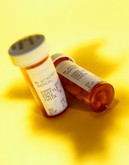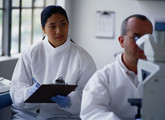Biosimilars/News
Rituximab gets US FDA approval for chronic lymphocytic leukaemia
The US FDA has approved Roche’s Genentech/Biogen Idec's anti-CD20 monoclonal antibody Rituxan/MabThera (rituximab) plus chemotherapy for people with either previously untreated or previously treated (relapsed or refractory) chronic lymphocytic leukaemia (CLL).
As pointed out by Scrip, MabThera was approved in the EU in 2009 for these same indications. However, US approval was held up by a complete response letter issued by the FDA in November 2009. The companies said then that the agency had not requested any new data to complete its review of these applications, but that they were continuing final labelling discussions.
FDA approves Amgen’s and Johnson & Johnson's the risk evaluation and mitigation strategy (REMS) for erythropoiesis-stimulating agents (ESAs)
Amgen and Johnson & Johnson (J&J) announced on 16 February 2010 that the US FDA approved the companies' risk management strategy for patients with chemotherapy-induced anaemia who are receiving erythropoiesis-stimulating agents (ESAs), including Amgen's Aranesp (darbepoetin alfa) and Epogen (epoetin alfa), and Johnson & Johnson's Procrit (epoetin alfa).
Aglycosylated IgG mAbs can be engineered to display unique FcγR selectivity that mediate antibody dependent cell-mediated cytotoxicity
Until recently, bacterially derived monoclonal antibodies (mAbs) were unable to recruit innate immune cells and were thus ineffective at raising an attack against tumour cells. However, Mr George Georgiou et al. of the University of Texas, Austin, found that engineered mutations in the Fc domain can improve innate immune cell recognition by mAbs manufactured in bacteria, as published in the Proceedings of the National Academy of Sciences.
The study stems from efforts to make therapeutically useful mAbs in bacteria. A key roadblock is that bacterially manufactured antibodies lack Fc region glycosylation. “Antibodies that are not glycosylated cannot be recognised by immune cells,” said Mr Georgiou. In the article it is described how aglycosylated IgG variants expressed in bacteria that selectively bind FcγRI potentiate tumour cell killing by monocyte-dendritic cells. The authors explain that the N-linked glycan of immunoglobulin G (IgG) is indispensable for the interaction of the Fc domain with Fcγ receptors on effector cells and the clearance of target cells via antibody dependent cell-mediated cytotoxicity (ADCC). E.coli-expressed, aglycosylated Fc domains bind effector FcγRs poorly and cannot elicit ADCC.
US FDA prepares for biosimilars in 2011 budget plan, despite stalled healthcare reform bill
Increasing inspections and creating a regulatory pathway for the approval of biosimilars are among the most important areas of the US FDA's fiscal 2011 budget request, US Department of Health and Human Services (HHS) Secretary Ms Kathleen Sebelius says. In testimony before the House Energy and Commerce Committee on 4 February 2010, Ms Sebelius focused on funds included in the budget request for the FDA's efforts to improve medical product safety, including increased inspections and investment in tools to enhance the safety of increasingly complex drugs and biologics.
FDA accepts Teva’s biosimilar filgrastim BLA, Amgen not
The US FDA has accepted Teva‘s application to sell a biosimilar version of Amgen's Neupogen (filgrastim), although the biotech giant is working to block the move in court.
XM02, a granulocyte colony-stimulating factor (G-CSF), is designed to treat severe neutropenia, a haematological disorder characterised by an abnormally low number of white blood cells. If approved, the drug would be marketed under the name Neutroval by US pharma company Hospira, which in 2009 acquired worldwide rights to the new version in a deal that also saw it gain manufacturing capacity for filgrastim and pegfilgrastim - a long-acting version of the drug marketed by Amgen as Neulasta. The worldwide market for Neulasta and Neupogen currently stands at more than US$2 billion.
Celtic Pharma invests in Cantab, PolyTherics for ‘biosuperiors’
As reported by Genetic Engineering & Biotechnology News on 25 and 26 January 2010, Celtic Pharma Holdings is making an initial £5 million (about $8.1 million) investment in Cantab Biopharmaceuticals, Cambridge, UK. Cantab is wholly owned by the Celtic Pharma Holdings II LP (CP2) fund. The new CP2 funding will be spread over three years and will support the development of the firm’s first clinical-stage so-called ‘biosuperior’ biologic in haematology.
Korean biopharma gets support for biosimilars/biobetters
As reported by Narayan Kulkami, Singapore, in BioSpectrum Asia Edition on 18 January 2010, the [South] Korean biopharmaceutical industry continues to get the attention of the global players, mainly because the Korean government in 2009 identified ‘biopharmaceutical and medical equipment’ as one of the future engines for economic growth. The life sciences industry in Korea consists of close to 2000 companies including 580 pharmaceutical companies and 600 biotech companies. (see also Korean biopharma: special programme for biosimilars)
Korean biopharma: special programme for biosimilars
As reported by Narayan Kulkami, Singapore, in BioSpectrum Asia Edition on 18 January 2010, the Korean biopharmaceutical sector gets support for biosimilars and/or biobetters.(see also Korean biopharma gets support for biosimilars/biobetters)
Medarex: With CDA1, CDB1 MAbs better metronidazole or vancomycin treatment against C difficile toxins
New therapies are needed to manage the increasing incidence, severity, and high rate of recurrence of Clostridium difficile infection in which toxins A and B cause pseudomembranous colitis. This is associated with bleeding and a severe form of diarrhoea, which together can lead to perforation of the lower bowel and even death.
Campbell Alliance: how biotech should prepare for biosimilars
In the recently published article ‘Bracing for Biosimilars’ by Kuyler Doyle, Tony Lanzone and Fahti Khosrow-Shahi of management consultancy firm Campbell Alliance, some insight is given into what commercial and reimbursement decision makers for biotechnology companies should be doing to prepare for the arrival of biosimilars.










